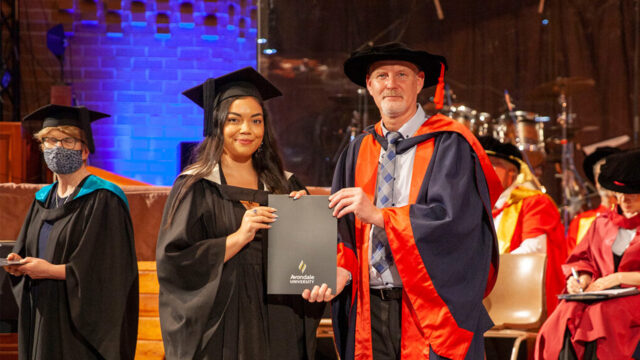For the future of our children.

When I was a kid, I had to learn the Ten Commandments in school. We were to memorize them and recite them for the class. The school provided us with a short version of the commandments, but my father encouraged me to learn the full version from the Bible. I’ve never been good at memorizing things like a parrot, so I’m not sure I managed to do them justice. I did, however, become acquainted with the biblical version. I didn’t think much about the content at the time; the commandments were just something I had to learn, and I found them reasonable.
As a teenager I became aware that one of the commandments stood out from the rest. The first commandments were about God, and the latter ones were about the way we treat our fellow human beings. But in the middle there was a commandment that had to do with specific people—parents. Why was there a need for a whole commandment about my parents? I also found it a bit vague. Honor my parents? Not that I had anything against them, but why so specific and yet so vague? What did it mean? This was also a commandment with a promise. A promise of longevity. How come?
New Insight
Years later, after I had finished my medical studies and started working as a resident in psychiatry, I began to realize how many people have never had a good relationship with their parents. They have never been loved or felt they could count on anyone. Never been able to trust. I learned through the theories of psychoanalysts John Bowlby and Mary Ainsworth and others how the early attachment we have to our parents is the blueprint for all later relationships in life. Whether it be loving relationships with a spouse, a teacher, an employer, or a person in authority—if it’s healthy, it enables us to trust others. We become able to transfer that trust to other relationships, which is crucial.
But the ultimate relationship is our relationship with God.
I remember when I first read about Enoch in Patriarchs and Prophets, by Ellen White. She wrote about how the birth of Methuselah changed Enoch and drew him nearer to God.1 He understood better his relationship with God when he saw the child’s dependence on and trust in him.
As parents we are God’s representatives to our children. If it is their responsibility to honor us, then it is our responsibility to be honorable. We must treat them in ways that encourage trust in us and show us as lovable.
In Child Guidance Ellen White writes:
“God’s method of government is an example of how children are to be trained. There is no oppression in the Lord’s service, and there is to be no oppression in the home or in the school. . . . Let kindness be the law of the home and of the school.”2
“Fathers and mothers, in the home you are to represent God’s disposition. You are to require obedience, not with a storm of words, but in a kind, loving manner. You are to be so full of compassion that your children will be drawn to you.”3
We cannot allow ourselves to lose our temper with our children or treat them in an unjust manner and expect them to follow our lead. (Although we cannot be responsible for all their future decisions.)
Eye-Opening Studies
There is, however, another important angle to consider: our children’s future health. In the CDC-Kaiser ACE Study4 (Adverse Childhood Experiences Study), which was first published in the late nineties, it was shown that our early childhood environment impacts our later health both mentally and physically. The study results indicate that neglect, violence, and household dysfunction of various kinds can lead to diverse chronic illnesses. It is thought that early adverse experiences will disrupt the neurodevelopment of the child, which then can lead to social, emotional, and cognitive impairment. That may cause them to adopt unhealthy behaviors, which in the end could lead to the development of disease and illness, and even early death.5 Studies such as these are truly sobering.
Few things likely impact a person’s future health as significantly as how they’ve been treated early in life.
Brain Development Takes Time
As I write this we are celebrating the “first day of summer” here in Iceland. This day is marked in the calendar every year, and we always hope that it will be sunny and warm. Sadly, it hardly ever is, because it’s still April—and, after all, we live in Iceland. But this is the time of year farmers prepare for lambing. Every time I witness this I’m amazed by how fast the lambs can stand on their own feet, and in just a few months they are independent individuals. It’s not so with us humans. A few decades ago we thought the development of the human brain was complete by the end of childhood. That is not so. Now we know that the process of building a human brain takes about 25 years.6 The first few years the brain develops fast, and then development plateaus until the adolescent years, when the brain takes a new jump in development—as does the rest of the body. Development of abstract thinking and social skills happens during that period. All these years our children need us (even when they are adamant that they don’t!), and we need to treat them in the most loving way, because if they “honor their father and their mother, their days may be long upon the land which the Lord their God is giving them” (Ex. 20:12, author’s paraphrase).
I’m not a perfect parent (just ask my son). None of us are. We all have our backgrounds and stories that make us who we are, together with our ideas of ourselves and others. We make mistakes and are in need of forgiveness. But we have a role model in our heavenly Father. Modern neuroscience tells us that the brain is “forgiving”; it is plastic, which means it can adapt over time, both in a negative way and a positive one. Therefore, we can learn new things, because the brain changes.7 That gives me hope.
So when you meet a person who has difficulty trusting, you can be their “mother” and “father.” You can help to change their way of thinking by being loving, and in so doing lead them to our loving Father in heaven.
Be honorable.
1 Ellen G. White, Patriarchs and Prophets (Mountain View, Calif.: Pacific Press Publishing Association, 1890, 1908), p. 84.
2 Ellen G. White, Child Guidance (Nashville: Southern Publishing Association, 1954), p. 259.
3 Ibid.
4 www.cdc.gov/violenceprevention/childabuseandneglect/acestudy/about.html
5 www.cdc.gov/violenceprevention/childabuseandneglect/acestudy/about.html
6 David Eagleman, The Brain: The Story of You Kindle edition (Edinburgh: Canongate Books, 2015), p. 14.
7 Ibid., p. 18.








